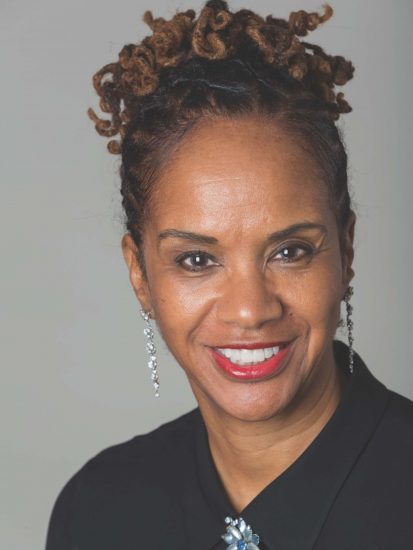Listening is big for Cheryl Stallworth (MBA ’81), even if her career did start behind the microphone working at a Madison radio station. It has been a through-line in her career of listening to consumers, in building her own management path, and in how she believes her work now can help create understanding and heal divisions.
Business Badgers got a chance to listen to Stallworth speak on a range of current topics that tapped into the impact of current events on corporations, leading during challenging times, brand purpose, innovation, and diversity and inclusion. She shared her insights recently during a Badger Executive Talk, a virtual speaker series featuring executives from the UW–Madison alumni community. Vallabh “Samba” Sambamurthy, Albert O. Nicholas Dean of the Wisconsin School of Business, led the conversation and fielded questions from alumni
Stallworth is co-founder of ShedLight, which provides insights about struggling Americans to companies, nonprofits, or foundations through storytelling and ethnographic research methods that reveal insights in a cultural context. Stallworth considers ShedLight a “social impact consultancy” that can work to bridge the divide among Americans by listening to their stories, while driving brand growth.

“When we started on this journey, we thought we knew a lot about consumer behavior,” Stallworth says. “We as marketers always think we know the American zeitgeist, but we realized we were wrong. There are millions of people who are struggling to make ends meet and we discovered that their stories are buried in metadata and media sound bites. So, it became our obsession to share their stories.”
Prior to ShedLight, she was CEO of Firefly, Kantar Millward Brown’s North American qualitative research division, for a decade. Earlier in her career, she worked with well-known brands such as Colgate-Palmolive and Coca-Cola in global roles. She is on WSB’s External Advisory board and is a past board member for the Center for Brand and Product Management.
As a Black woman earning an MBA and climbing the corporate ladder in the 1980s and ’90s, Stallworth has had a career of “firsts” that helped inform her leadership journey. With Dean Samba, she shared some of her experiences and insights from a career of helping brands make a positive impact on the world.
Teach people how to treat you. Stallworth said she has learned to set boundaries on how she wanted people to treat her. “The ‘80s are almost ancient history now. There were things people did and said then that you could never get away with now,” she says. After one meeting where she thought her boss treated her poorly, Stallworth told her she was uncomfortable by the exchange. “My boss was shocked, but it never happened again.”
Try a little kindness. Stallworth had few Black or female colleagues early in her career and the “rough and tough” atmosphere wasn’t her style. “The CEO of Colgate once told me that love is a greater motivator than fear and I always remembered that,” she says. “When I became a leader, I tried to remember that and tried to create an environment that people wanted to go to every day.”
Take risks. At Firefly, Stallworth and her team partnered with Chicago’s famed Second City comedy theater to help gain consumer insights through live improvisation with consumers. “It’s an excellent way to spark new thinking,” she says. “That’s the kind of thing you can do in marketing if you’re willing to step outside the traditional ways of doing things.”
Find a purpose for your brand. A brand can make a profit, Stallworth says but it’s also important to make an impact on society. At Colgate, where Stallworth once worked in Latin America, the company established an oral health program that was so successful that Colgate has a market share that exceeds 75 percent and people use the word “Colgate” when they mean “toothpaste.” “A great purpose, if well executed, provides a foundation for every experience,” she says. “It’s the underlying essence that makes a brand necessary, relevant, and part of the culture. There are brands that do that very well.”
Make sure diversity starts at the top. It’s not enough to have a diverse workforce, Stallworth says. Leadership must be diverse as well, something she believes helped draw a diverse workforce at Firefly. “You can’t attract a diverse workforce if they don’t see it modeled at the top.”
Recognize a massive shift—and listen. From the pandemic to social unrest and other challenges, the business world has changed, Stallworth says. “Leading companies don’t have the luxury of sitting on the sidelines and waiting for things to pass so they can get back to business as usual. I don’t think there is going to be business as usual anymore.” It comes down to purpose, she says. “A great way to move forward is to find that purpose and bring myriad voices to the table in order to execute the purpose,” she says.
Additional Badger Executive Talks are scheduled in the coming months: Ericson Chan (BA ’90), group chief information and digital officer at Zurich Insurance Company on March 4; and Tom Falk (BBA ’80), former chairman of Kimberly-Clark on April 28.
The Badger Executive Talks event page features more information about the talks and links to view past conversations.